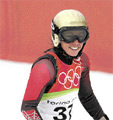 SESTRIERE, Italy – Almost everyone who meets Chirine Njeim for the first time, looks into her blue-green eyes and says, "You’re from Beirut?"Eventually, they see the skis and snow pants and boots and red winter jacket with the word Lebanon across the back, and say, "An Olympic skier from Lebanon?""A lot of people are confused," Njeim said. "I can understand that."
SESTRIERE, Italy – Almost everyone who meets Chirine Njeim for the first time, looks into her blue-green eyes and says, "You’re from Beirut?"Eventually, they see the skis and snow pants and boots and red winter jacket with the word Lebanon across the back, and say, "An Olympic skier from Lebanon?""A lot of people are confused," Njeim said. "I can understand that."
Lebanon, land of camels and sun and sand, also has mountains, snow, six ski resorts and light-eyed 21-year-old Njeim. She learned to ski at age 3, became good enough to compete internationally and developed anorexia in her zeal to be even better.Now recovered and up to 130 pounds – 46 more than her one-time dip to 84 preceding the Salt Lake City Olympics – Njeim (pronounced nJIM) is one of two Turin Olympians representing Beirut. The other, Patrick Antaki, is a 41-year-old skeleton slider who lives in Plano, Texas, and has U.S.-Lebanese citizenship.Njeim carried the Lebanese flag as the only Olympian from her country at the 2002 Winter Games, when she was starting to recover and barely weighed 100 pounds and was "terrified that I’d fall and trip with it," she said.
She finished 36th in slalom and 45th in giant slalom at those Olympics in Salt Lake City, where she lives and trains most of the year. Utah, she said, is considerably more conducive to competitive skiing than the Middle East.
This time around, she also qualified for the other three events: downhill, combined and super-G.
"She’s extremely driven, an incredible athlete and incredible person," said her American coach, Kyle Hopkins of Salt Lake City. "Lebanon is not exactly a country that supports skiers, so it’s much harder for her. But we think she’s good enough to finish in the top 15 of her events. She’s getting there."
Last Wednesday, Njeim placed 34th of 40 competitors in the downhill in 2:02.86 – more than six seconds behind winner Michaela Dorfmeister of Austria. On Friday night, in what she called her worst event even before it began, Njeim straddled a slalom gate in the combined event, flipped over and crashed onto her back. Within 10 minutes, she was walking gingerly off the course with a half-embarrassed, half-resigned grin.
"I came into the turn a little early and hooked the gate," she said. "It’s like falling on ice. It hurts. But I’m fine. I can try this one again because slalom is coming up (Wednesday)."
Njeim’s enthusiasm and optimism are endearing to those who know her.
"I remember seeing this little 10-year-old speeding down the mountain in Lebanon and thinking, `Who is that?’ " said Tamer Makram Alamuddin, whose father, Makram Alamuddin, is the secretary general of the Lebanese Olympic Committee. "She’s a great athlete and an awesome person. We’re all very proud of her."
Njeim said she was drawn to skiing almost immediately as a child learning the sport with her parents, sister and two brothers. During the winter months, she’d come home from school and immediately tune her television to Eurosport – the international version of ESPN. The ski racing, she said, mesmerized her.
"I just couldn’t stop watching," she said. "I told my parents I loved to ski. I told them, `I want to be like that!’ "
Njeim’s father Raymond (he is a native Lebanese despite his first name, Njeim explained), a distributor of chemical products, and Najah, a homemaker, knew their daughter couldn’t develop as a competitive skier in Lebanon. She went to France to train for a couple of years in her early teens, then moved to Salt Lake City in ninth grade to attend the Rowmark Ski Academy, former home of U.S. Olympian Picabo Street.
It was there, during the 2000-’01 season, that Njeim tore the anterior cruciate ligament of her right knee, and had reconstructive surgery. She recovered by the next season but caught pneumonia – the beginning of another traumatic period.
"I was really out of it. No energy," she said. "My only way to come back was to get stronger and eat healthier. I think I overdid trying to be healthy.
"I stopped eating."
Njeim said at first she’d "eat lightly," then she "wouldn’t eat anything.
"I mean nothing. I’d have an apple or soda or water, and that was it all day. Finally I was forced to see a doctor two times a week to get weighed. I got to the point where I was like, `Oh my God, I’m so fat.’ "
Njeim went home to Beirut the summer before the 2002 Winter Games, and was jolted into reality.
"One of my best friends didn’t recognize me," she said. "That day I began to eat again."
Her 22-year-old sister, Nesrine, will visit Italy this week to watch Njeim in her remaining events. Today she races in the super-G. Mom and dad are watching intently from Lebanon.
"I’m best in super-G," she said. "So let’s see what happens. I think things will get better. Please tell the people of Lebanon I thank them for all their support. I know they’re excited I’m here, even if it’s unusual."



